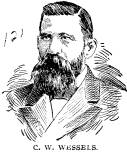Ohio History Journal
|
Comments, Notes and Reviews. 139
heartedness. Many incidents occurred during his stay to evidence the gentleness of his nature and the breadth of his sympathy with the unfor- tunate and the oppressed.
THE BOERS IN OHIO. On Monday evening, June 12, but a few days after the departure of Admiral Dewey, the city for a few hours was the host, as Mr. Dooley would say, "inofficially" of two other distinguished guests, namely, |
|
|
Messrs. Wessells and Fischer, Boer representatives of the Transvaal Republic, who are traversing this country in the hopes of eliciting sympathy and aid for the sister republic in the heart of Africa. In March the two South African Republics (Republic of South Africa and Orange Free State) addressed to the United States Government and some of the European powers, particularly Belgium, Holland and Switzerland, through their consuls at Pretoria, a request for friendly "irtervention" in behalf of their country in the unequal struggle with the British Empire. Replies from all the select |
|
invitees were received of the polite "compliments but regrets" order. Secretary Hay and Lord Salisbury exchanged notes in which Uncle Sam expressed "hope that a way to bring about peace might be found" but John Bull coldly intimated that the "affair" had gone too far and would have to be continued to "a finish." The Envoys then as a dernier resort turned their faces America-ward and landed in New York May 15. The two named above entered Columbus late in the evening, almost unheralded, and were escorted by a semi-self-constituted com- mittee of prominent citizens to the City Hall, where an audience of 500 or 600 gave them a half-hearty welcome as they passed up the aisle to the stage. The Mayor of the city, several councilmen and an ex-mayor spoke a few words of greeting in glittering generalities. Mr. C. W. Wessels, President of the Transvaal Volksraad, presented at some length the claims of his countrymen to the sympathy of the American people. Mr. Wessells, we were told, was a typical Boer, exceedingly tall, mus- cular build, and long, flowing patriarchial beard. He spoke with a sort of German accent, but in very good English and in a forceful and sincere manner. He gave a brief and desultory historical sketch of the South African Republic, dwelling with great emphasis upon the com- mon racial origin of the Boers and Americans; upon the fact that the early ancestry of the Boers left their native Dutch country to found a new republic in the dark continent but a few years after the Pilgrim Fathers sailed from Holland to establish the American Republic on the shores of Cape Cod. He gave illustrations to show that the English had always been the oppressors of the Boers, and that they had always |
